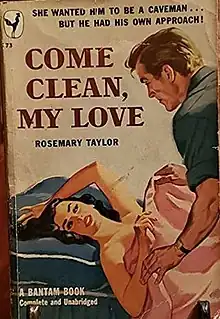Come Clean, My Love
Come Clean, My Love is a 1949 novel by Rosemary Drachman Taylor. Like her prior novels, the book began as a re-telling of factual events about her family's life in early 1900s Tucson. This time it was to focus on her brother Oliver and his inheriting their father's steam laundry, but due to complaints from her family about telling all their secrets, and the author's own feeling of constraint about having to follow real life, the novel turned into one of pure fiction.[1][2][3] In May 1949 the book was selected to appear in condensed form in Woman's Home Companion.[4] To celebrate the launch of the new book, a party was thrown at the steam laundry in Tucson, Arizona started by her father and run by her brother, which became the fictional setting for the novel.[5] John Winchcombe-Taylor, Taylor's husband, adapted the book into a play, which premiered in Tucson at the Tucson Little Theater in October 1949.[6][7]
 | |
| Author | Rosemary Drachman Taylor |
|---|---|
| Country | United States |
| Language | English |
| Subject | Americana |
| Genre | Comedy |
| Set in | Tucson, Arizona |
| Publisher | T. Y. Crowell Company |
Publication date | 1949 |
| Pages | 245 |
Plot
When Wyatt Bruce's father suddenly cuts off his alimony payments, Wyatt is forced to look for work. His mother owns a half-interest in a local steam laundry, however the laundry is not doing well. Wyatt goes to work at the laundry in order to turn it into a success. With the help of his wealthy fiancé, Cordelia, he turns the business around, but also creates a love triangle between himself, Cordelia, and the daughter of the owner of the other half of the laundry, Janey.
Reception
The book received mixed reviews. The Arizona Daily Star said that "Mrs. Taylor has written a farce comedy with no pretensions other than wringing out as many laughs as the laundry did sheets. It's fun".[8] The Indianapolis Star gave the book a good review, stating that the book "mixes a fresh entertainment salad listed on the booksellers summer menu", and that "It can't miss."[9] The Los Angeles Times also enjoyed the book, calling it, "Fun in a laundry", and further stating, "Mrs. Taylor's slang shot manner of writing is a little maudlin at times, but it is never mincing or will-o'-the-wisp. She has a roguish and disrespectful eye for the amenities.[10]
References
- "Elinor Maxwell". St. Louis Globe-Democrat. April 24, 1949. p. 57. Retrieved May 17, 2022 – via Newspapers.com.

- "Sashayin' Around". Arizona Daily Star. October 31, 1948. p. 5. Retrieved May 17, 2022 – via Newspapers.com.

- "Tucson To Meet Author Of 'Come Clean, My Love'". Arizona Daily Star. June 17, 1949. p. 16. Retrieved May 17, 2022 – via Newspapers.com.

- "Tucson's Writer Novel Appears in Companion". Arizona Daily Star. May 13, 1949. p. 9. Retrieved May 17, 2022 – via Newspapers.com.

- "Laundry Party Honors Author". Arizona Daily Star. June 19, 1949. p. 12. Retrieved May 17, 2022 – via Newspapers.com.

- "Hollywood Eyes 'Come Clean'". Tucson Citizen. October 24, 1949. p. 22. Retrieved May 17, 2022 – via Newspapers.com.

- "Local Play To Launch Season". Arizona Daily Star. October 23, 1949. p. 23. Retrieved May 17, 2022 – via Newspapers.com.

- "Love, Laughs and Laundry". Arizona Daily Star. June 19, 1949. p. 18. Retrieved May 17, 2022 – via Newspapers.com.

- "'Come Clean, My Love'". The Indianapolis Star. June 26, 1949. p. 54. Retrieved May 17, 2022 – via Newspapers.com.

- "Bookman's Notebook". The Los Angeles Times. June 26, 1949. p. 39. Retrieved May 17, 2022 – via Newspapers.com.
